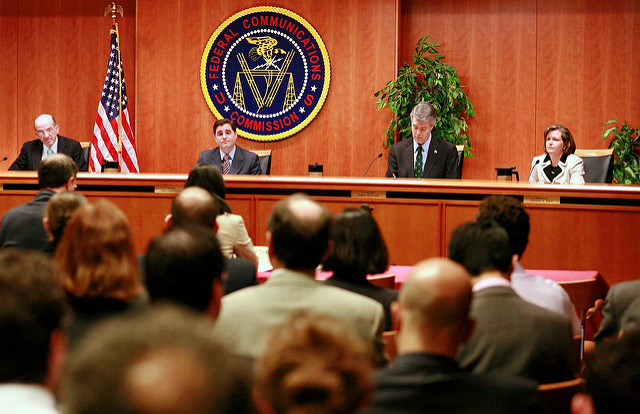Category Archives: Uncategorized
Consumer Advocates Back FCC Proposal For Broadband Privacy Rules
by Rick Weber, Inside Cybersecurity

Consumer advocates are backing the general intention of a Federal Communications Commission proposal that would impose privacy requirements on Internet service providers. Read More ›
Not So Gainfully Employed
by Scott Jaschik, Inside Higher Ed

Students who enroll in certificate, associate and bachelor’s programs at for-profit colleges and universities generally see a decline in earnings (and typically greater debt) five or six years after attendance, compared to their earnings before enrollment, according to a study released Monday. Read More ›
Can You Afford That Payday Loan? Feds Say Lenders Should Ask
by James Rufus Koren, Los Angeles Times

At the heart of the Consumer Financial Protection Bureau proposal is a requirement that lenders determine that a borrower has the ability to repay. Read More ›
New Law Bans Rental Companies From Using Recalled Cars
by Keith Laing, Detroit News

The new law requires rental companies with fleets of more than 35 vehicles to pull recalled cars from their rotations until they are repaired. Read More ›
Bill Banning ‘Gender Tax’ Clears California Senate
by Alexei Koseff, Sacramento Bee

Pink scooters that cost double their red counterparts. “Boyfriend”-style clothing far more expensive than the men’s fashion it mimics. These are the scenarios that California legislators aim to outlaw with Senate Bill 899, a prohibition on “gender price discrimination” that often sees women charged more for similar goods. Read More ›
Virtual Assistants Such As Amazon’s Echo Break US Child Privacy Law, Experts Say
by Mark Harris, The Guardian

An investigation by the Guardian has found that despite Amazon marketing the Echo to families with young children, the device is likely to contravene the US Children’s Online Privacy Protection Act, set up to regulate the collection and use of personal information from anyone younger than 13. Read More ›
The 3 Myths Banks Are Using To Defend Their ‘Get Out Of Jail Free’ Cards
by Chris Morran, Consumerist

Very few lawyers will take on a single consumer’s arbitration dispute because it’s not worth their time. Some arbitration clauses also force the customer into arbitrating their case in a specific venue, so you could have to travel all the way across the country for the possibility of minimal rewards. Arbitration also sets no legal precedent, so even if one customer prevails, another customer might fail using the exact same evidence. Read More ›
AB 2395: AT&T Wants To Disconnect Millions Of California Landlines

According to the Assembly Utilities and Commerce Committee, about 16.5 million traditional copper land lines remain in service in California. AT&T’s bill would create a pathway for phone companies to abandon residential land lines in 2020, even in areas where an adequate alternative phone option does not exist. While many consumers now have cell phones or IP phones as well as land lines, about 2.3 million Californians live in a home that only has a landline. AB 2395 will eliminate both customer choice and the current requirements for Carriers of Last Resort that ensure all Californians have access to reliable essential phone services. Read More ›
Why A Staggering Number Of Americans Have Stopped Using The Internet The Way They Used To
by Andrea Peterson, Washington Post

Nearly one in two Internet users say privacy and security concerns have now stopped them from doing basic things online — such as posting to social networks, expressing opinions in forums or even buying things from websites, according to a new government survey released Friday. … When asked to list their biggest concerns, nearly two out of three respondents cited identity theft, while nearly half brought up credit card or banking fraud. About one in five listed data collection by the government. Read More ›
State Regulators Reopen Case On San Onofre Nuclear Plant
by Ivan Penn, Los Angeles Times

The ruling follows a $16.7-million fine in December [against Southern California Edison] … imposed because of Edison’s failure to report back-channel communication between Edison representatives and commission representatives. … The closure led to a settlement agreement approved by the utilities commission. Under the deal, the plant’s owners — Edison and San Diego Gas & Electric Co. — would pay $1.4 billion in reactor closing costs; their customers were left on the hook for an additional $3.3 billion. Read More ›
Lawmakers Sweat Details Of Consumer Health Privacy
by Cheryl Miller, The Recorder (San Francisco)

“We are in total agreement with the intent of the bill and believe that it’s very, very important that this information be given strong privacy protections,” Richard Holober, executive director of the Consumer Federation of California, told the Assembly Privacy and Consumer Protection Committee. But “we’ve had a lot of experience over the years with various privacy laws and how courts interpret those laws and … we want to be very precise about how a bill is written to make sure that it’s being interpreted by the industry and the courts as it was intended,” Holober said. Read More ›
Why More Widowed Homeowners Are Struggling To Prevent A Foreclosure
by Andrew Khouri, Los Angeles Times

The state Senate Judiciary Committee [voted] Tuesday on a bill designed to give surviving spouses, domestic partners and children the same protections borrowers have in the Homeowner Bill of Rights, including the right to sue to stop a foreclosure or for economic damages after one occurs. The bill, SB-1150 … would prevent servicers from moving forward with a foreclosure before requesting “reasonable” documentation of the borrower’s death and the identity of the survivor. Read More ›
Corinthian Colleges Students Unlikely To See $1.2 Billion Judgment
by Roxana Kopetman and Mark Muckenfuss, Orange County Register

Experts said recovery of the judgment is unlikely. And some students and their advocates said they haven’t yet gotten what they really need: release from school-loan debts. In California, 13,000 students were attending Corinthian schools when the doors shut. … The bankrupt Corinthian closed its for-profit schools last year amid accusations that the chain falsified grades, attendance and job-placement rates. Students complained of deceitful practices that often targeted low-income students by promising a lot but offering very little. Read More ›